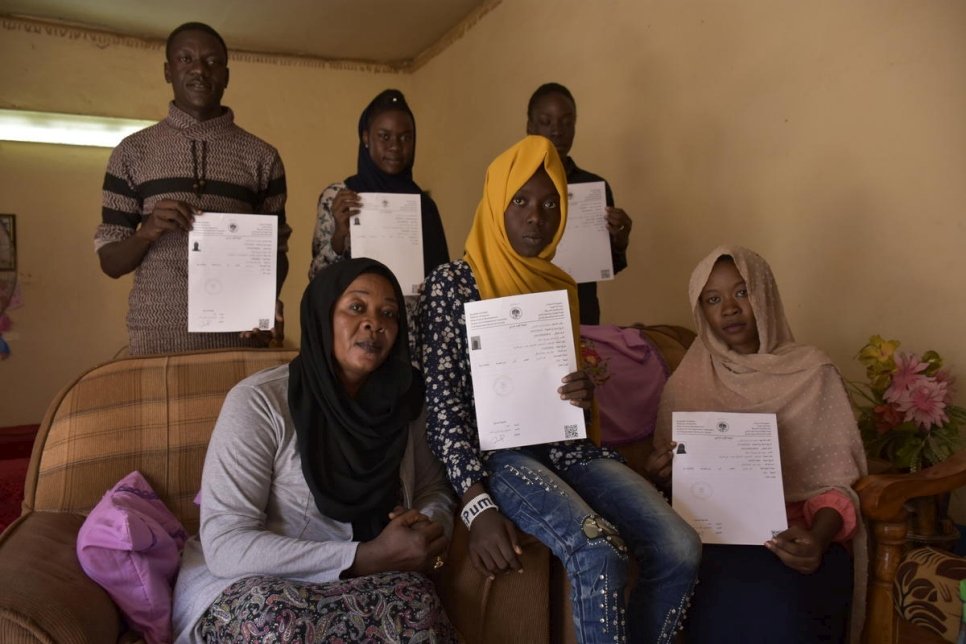Sudanese mother wins citizenship for her children after seven-year legal struggle
Her victory comes on the heels of recent positive court rulings and paves the way for her children to continue their education, find work and belong to their country.

Hanan Jaber Abdallah (seated at left) poses for a photo with her five children as they hold up their hard-won Sudanese citizenship documents. © UNHCR/Mohamed Elfatih Elnaiem
When South Sudan gained independence from Sudan in 2011, Hanan Jaber Abdallah had no idea the historic move would make her five children invisible, by rendering them stateless. But like thousands of people with parents of mixed South Sudanese and Sudanese descent, they lost their Sudanese nationality immediately after the split.
Hanan herself is Sudanese, but Sudanese nationality laws did not give mothers the right to automatically pass citizenship on to their children. Her husband, originally from the south of Sudan, was unable to establish his own nationality in either country. And so their children, whose birth certificates said they were born in Sudan, found themselves stateless<.
“I couldn’t pass on my nationality to them,” Hanan said. “We didn’t think they would need another identity document.”
“I could not sleep at night. I was afraid I wouldn’t complete my education.”
It was Hanan’s eldest daughter, Benazir, who first came to the grim realization that she and her siblings were no longer citizens. It was 2012, and Benazir was ready to take her national high school exams but lacked the required ID. Her mother tried to apply for a national identification number for her, but it was rejected by the government’s Civil Registry.
Benazir was devastated. “I could not sleep at night,” she recalled. “I was afraid I wouldn’t complete my education.”
She continued school, but had to register as a foreigner, as did her younger siblings. Her school fees were more than ten times higher than for Sudanese students, and her family had to borrow money from relatives.
- See also: Ending Statelessness
“I even dropped out for a year because my parents could not afford the fees,” Benazir said. “I missed an internship opportunity as a researcher in a government laboratory.”
After learning from a community volunteer that UNHCR, the UN Refugee Agency, provided legal aid to those facing statelessness, Benazir urged her mother to ask for help. For the next seven years, Hanan’s sole mission was to secure her children’s nationality – and their future. Through her own determination, and support from UNHCR, she learned to navigate the complex legal system, meeting regularly with a lawyer to prepare for court appearances. She visited the Civil Registry at least ten times. But the travel and effort took a toll on her finances and her health. Her children suffered too.
“My heart is full of joy and I feel like a new dawn is breaking."
A breakthrough came on 15 December 2019, when Hanan finally received the nationality certificate for which she had fought. Her children’s lives immediately changed. Benazir, who had entered university, gained peace of mind, knowing she can get a job when she graduates. Her sister can enter university without paying exorbitant fees. A younger sister in elementary school no longer has to worry about the cost. The entire family told UNHCR they were relieved and felt their dignity had been restored.
“My heart is full of joy and I feel like a new dawn is breaking in my life,” Hanan said. Even so, she remains determined to continue advocating for mothers in similar circumstances. She shares her story whenever she can, hoping to inspire other women to fight for documentation and a future for their own children.
“Hanan’s perseverance and the legal aid and representation in courts by our partners brought about this change,” said Eman Awad Naser, a UNHCR protection official based in Khartoum. Eman added that Hanan’s resolve impressed officials at the Sudanese Civil Registry, which has helped some 1,300 Sudanese women pass citizenship to their children since 2018. UNHCR, for its part, has provided legal aid to over 500 families who lost their Sudanese nationality and were unable to obtain South Sudanese nationality following South Sudan’s independence in 2011.

Upon learning that her children were stateless, Hanan Jaber Abdallah, 43, embarked on a seven-year struggle to secure their Sudanese nationality. Legal support from UNHCR and its partner, and a change in the nationality law, helped her succeed. © UNHCR/Mohamed Elfatih Elnaiem
Sudan has made strides in changing its nationality laws. However, it remains one of 25 countries that do not yet allow women to pass their nationality on to their children the same way men can. Hanan’s case illustrates how legal, administrative and procedural barriers can thwart mothers like her for years.
Sudan is also a signatory to the 2017 Brazzaville Declaration on Eradication of Statelessness in the Great Lakes Region, which includes 11 commitments to eliminate statelessness. Among them are the reform of nationality-related laws and policies to ensure compatibility with international principles on statelessness, accession to UN statelessness conventions and the removal of gender discrimination in nationality laws and policies.
Gender discrimination in the transfer of nationality is one of the leading causes of statelessness globally. When fathers cannot, or will not, pass on their nationality to their children, mothers in these countries have no options. There are millions of stateless people around the world who lack access to fundamental rights, such as education, health care and opportunities for employment. Things most people take for granted – like getting married, opening a bank account or even travelling – can be impossible for them. Children who are stateless often face discrimination not only from institutions and the state, but even their own families.
Five years ago, UNHCR launched the IBelong campaign to end statelessness around the world by 2024.
